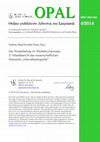Books by Katrin Thier
Monograph discussing various cultural and antiquarian themes and their popular reception in the c... more Monograph discussing various cultural and antiquarian themes and their popular reception in the context of a 1978 Doctor Who serial. Available at:
https://obversebooks.co.uk/product/47-the-stones-of-blood/
Papers (Ships) by Katrin Thier
Archaeonautica: Open Sea | Closed Sea. Local and Inter-Regional Traditions in Shipbuilding, eds. G. Boetto, P. Pomey & P. Poveda, 2021
Discussing the name of the ship type "buss": https://journals.openedition.org/archaeonautica/3549
Baltic and beyond, Change and continuity in shipbuilding, eds. J. Litwin & W. Ossowsky, Gdansk, 2018
R. Bockius (ed.), Between the seas: Transfer and exchange in nautical technology; pp 149-156, 2009
Engert, A et al. (ed.), Connected by the sea, p. 210-216, 2006
Transactions of the Philological Society, 109/2, 2011
http://onlinelibrary.wiley.com/doi/10.1111/j.1467-968X.2011.01273.x: Language contact and the tra... more http://onlinelibrary.wiley.com/doi/10.1111/j.1467-968X.2011.01273.x: Language contact and the transfer of technologies are closely linked and often influence each other. This paper examines a few examples from the domain of seafaring at various periods relevant to the history of Anglo-Saxon England and the Old English language. The origin of Old English segl is used to illustrate prehistoric influences reflected in the recorded vocabulary; the fate of ciula, the Latin adaptation of ceol, shows the failing of a borrowing in the course of the Anglo-Saxon period; and floege and cuople are rare Viking Age survivors of oral and literary contact with two very different languages.
Maren Clegg Hyer and Gale R. Owen-Crocker (eds.) The Material Culture of Daily Living in the Anglo-Saxon World; Exeter Studies in Medieval Europe , 2011
Matti Kilpiö and Leena Kahlas-Tarkka (eds.) Anglo-Saxons and the North; ISAS Essays in Anglo-Saxon Studies, Vol. 1, 2009
International Journal of Nautical Archaeology, 2003
The origin of sail has been debated for a long time, but the linguistic evidence has rarely been ... more The origin of sail has been debated for a long time, but the linguistic evidence has rarely been taken into account. The word sail has a cognate in two Celtic languages, and a good linguistic chronology is available for these. The reconstructed historical development of Celtic and Germanic words indicates that the word existed in West Germanic well before the Anglo-Saxon migrations and the confinement of Celtic to the British Isles. An origin of both word and technology in the Celtic world is proposed, both being passed into the Germanic world in the Rhine region.
in H. Eilbracht et al. Itinera Archaeologica (FS T. Capelle), pp 281-294, 2005
The Mariner's Mirror 86/2, 2000
Papers (Lexicography) by Katrin Thier
England, Ireland, and the Insular World, Ed. Mary Clayton, Alice Jorgensen, Juliet Mullins., 2017
Historische Lexikographie zwischen Tradition und Innovation ; Ed. by Lobenstein-Reichmann, Anja / Müller, Peter O., pp. 251–270., 2016

Abel, Andrea / Klosa, Annette (Hrsg.): Der Nutzerbeitrag im Wörterbuchprozess. 3.Arbeitsbericht des wissenschaftlichen Netzwerks“Internetlexikografie”. (OPAL 4/2014) - Mannheim: Institut für Deutsche Sprache; pp. 63-70., 2014
Das Werk einschließlich seiner Teile ist urheberrechtlich geschützt. Jede Verwertung außerhalb de... more Das Werk einschließlich seiner Teile ist urheberrechtlich geschützt. Jede Verwertung außerhalb der engen Grenzen des Urheberrechts ist ohne Zustimmung der Copyright-Inhaber unzulässig und strafbar. Das zulässige Zitieren kleinerer Teile in einem eigenen selbstständigen Werk (§ 51 UrhG) erfordert stets die Angabe der Quelle (§ 63 UrhG) in einer geeigneten Form (§ 13 UrhG). Eine Verletzung des Urheberrechts kann Rechtsfolgen nach sich ziehen (§ 97 UrhG). Dies gilt insbesondere für Vervielfältigungen, Übersetzungen, Mikroverfilmungen und die Einspeicherung und Verarbeitung in elektronischen Systemen. Die zugänglichen Daten dürfen von den Nutzern also nur zu rein wissenschaftlichen Zwecken genutzt werden. Eine darüber hinausgehende Nutzung, gleich welcher Art, oder die Verarbeitung und Bearbeitung dieser Daten mit dem Zweck, sie anschließend selbst oder durch Dritte kommerziell zu nutzen, bedarf einer besonderen Genehmigung des IDS (Lizenz). Es ist nicht gestattet, Kopien der Textdateien auf externen Webservern zur Verfügung zu stellen oder Dritten auf sonstigem Wege zugänglich zu machen. Bei der Veröffentlichung von Forschungsergebnissen, in denen OPAL-Publikationen zitiert werden, bitten die Autoren und Herausgeber um eine entsprechende kollegiale Information an
in Archaeology from the Wetlands, Proceedings of the 11th WARP Conference 2005, pp. 349-354, 2007
The etymologies of MOOR and MOSS viewed against the historical environment.
(with main author Philip Durkin) in T. Städtler (ed.) Wissenschaftliche Lexikographie im deutschs... more (with main author Philip Durkin) in T. Städtler (ed.) Wissenschaftliche Lexikographie im deutschsprachigen Raum (2003), 529-540
(in German)











Uploads
Books by Katrin Thier
https://obversebooks.co.uk/product/47-the-stones-of-blood/
https://www.asbooks.co.uk/subj-list-Anglo-Saxon-Ships-Sea-Naval-Power.htm
https://www.barpublishing.com/altenglische-terminologie-fur-schiffe-und-schiffsteile.html
Papers (Ships) by Katrin Thier
Papers (Lexicography) by Katrin Thier
(https://www.degruyter.com/view/book/9783110493924/10.1515/9783110493924-012.xml)
(in German)
https://obversebooks.co.uk/product/47-the-stones-of-blood/
https://www.asbooks.co.uk/subj-list-Anglo-Saxon-Ships-Sea-Naval-Power.htm
https://www.barpublishing.com/altenglische-terminologie-fur-schiffe-und-schiffsteile.html
(https://www.degruyter.com/view/book/9783110493924/10.1515/9783110493924-012.xml)
(in German)
original English version (1999) on
http://www.midwinter.com/lurk/making/ships.html ;
revised German version (2000) on http://www.midwinter.de/lurk/making/ships.html